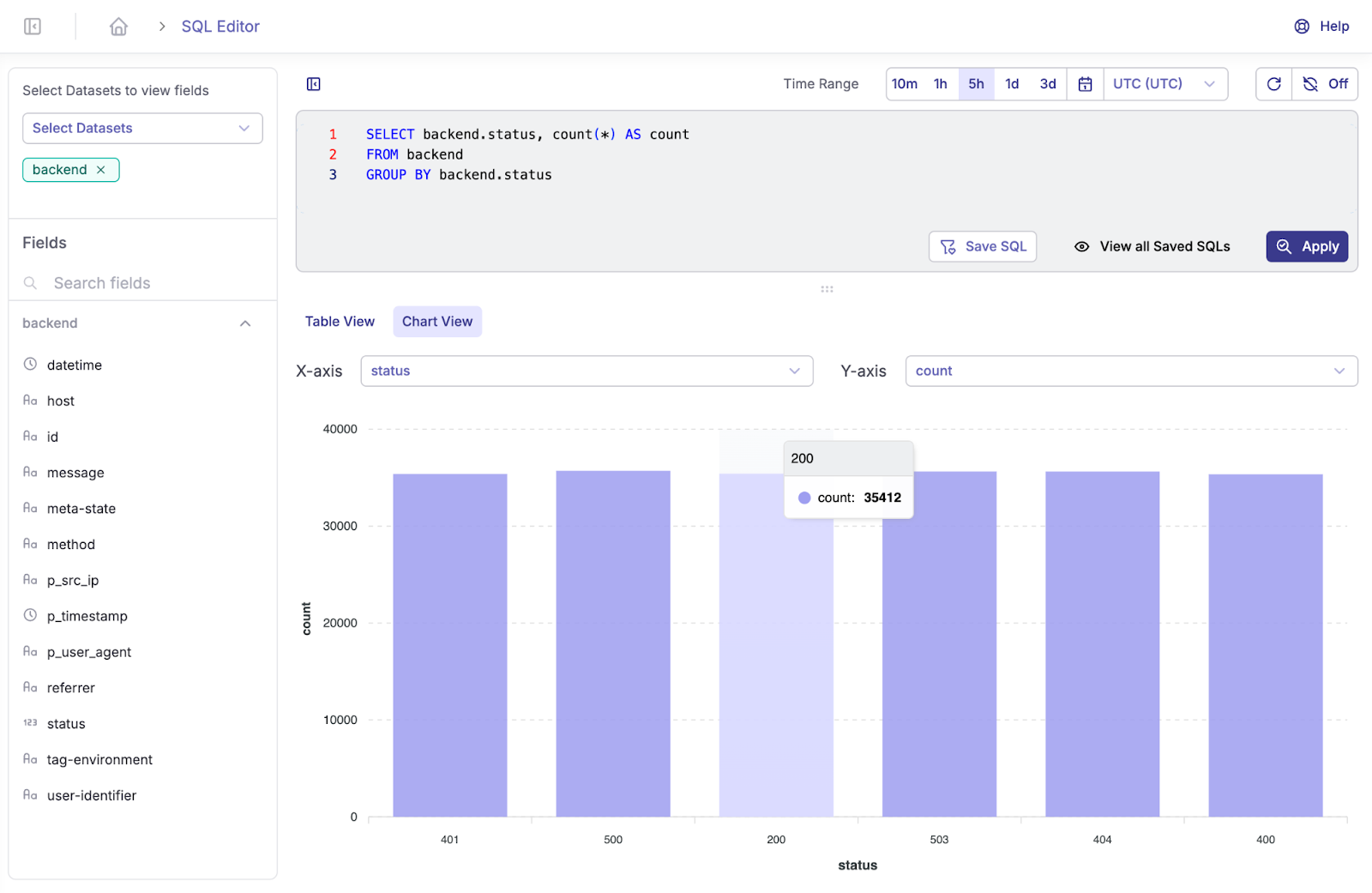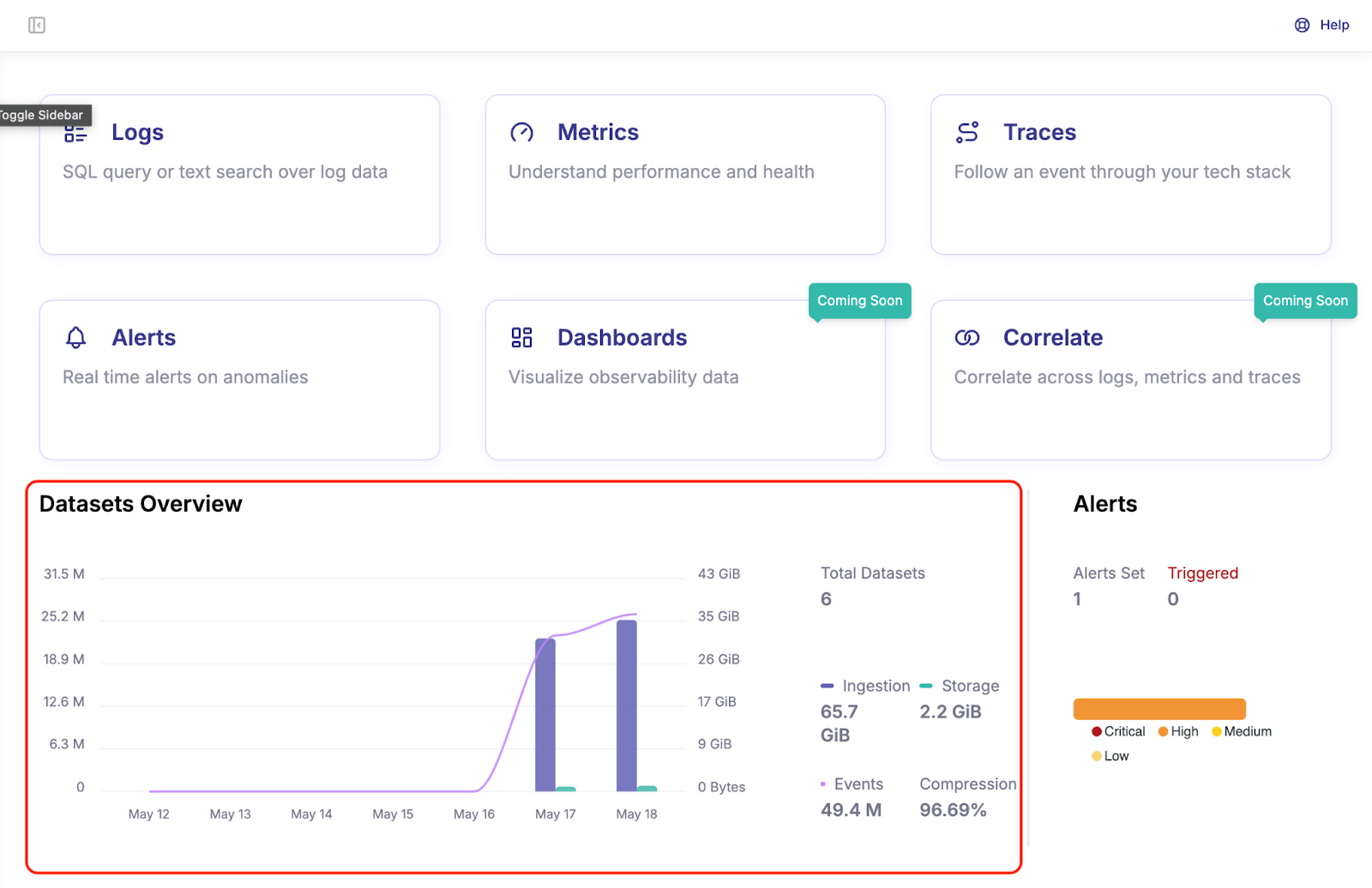Today, we are excited to announce the release of ParseableDB v2.3.0!
Following our milestone v2.0.0 release, where we introduced a dedicated enterprise offering alongside our robust open-source solution, we've continued to enhance the platform based on valuable feedback from our users and community.
With version 2.3.0, we've incorporated OpenTelemetry native data flattening and columnar storage. This allows much better compression and fast querying along any OTel attribute.
As an OTel practitioner you can now expect a great deal of flexibility when looking for signals with one or more attributes. For example you can use SQL queries like Select body where attr_a like a and attr_b like b.
Let’s look at other improvements, bug fixes and highlights of this release.
Enhancements
SQL editor visualisation - SQL editor page allows slicing and dicing data exactly as you wish. We now added visualisation capabilities to the SQL editor. After running a query, you can either inspect the raw rows or quickly switch to a visual chart for better pattern recognition.

Home chart improvements - Landing page shows a high level overview of your Parseable instance. We have now enhanced the overview section with deeper insights into total ingestion, compression and storage details.
We’ve also improved the search API response in the sidebar, so you can quickly look up saved filters, alerts, datasets among others.

Streaming response - We have now added support for streaming response for query. This improves responsiveness for queries that involve downloading larger data chunks. This is available as a flag for the query API. Refer to the Parseable docs on how to use this API.
Enterprise updates:
-
Schema detection improvements: Parseable Enterprise edition supports automatic schema detection. The server identifies formats sent by a client when a header is set. Server also validates if the format is actually the same as set by header. This allows a consistent experience on the server side - so users can reliably build dashboards, alerts and other visualisations without being concerned about an offending client.
In some cases where the format doesn’t match the header specified, we now added support for a column that marks this result. You can now decide to use the mismatched data or not based on the value of
p_format_verified. -
LLM configuration across roles - As we proceed our journey of adding native Large Language Model (LLM) support to improve MTTR and leverage user’s time better. We have now added user specific actions to add LLM config.
This means every user can have a separate LLM key and related config and use their config for their tasks with complete isolation from other user’s actions, history etc.
Bug Fixes
- Timezone handling explore page - Fix timezone management on log explore page ensuring accurate log display aligned to user-selected timezones.
- Settings page access - Ensured the Settings page is consistently accessible to all users, addressing previous visibility inconsistencies.
- Loaders & error states - Added loading indicators and improved error messaging on user and dataset pages, resulting in a clearer user experience during data fetching and error scenarios.
- Distinct SQL query in Datasets API - Corrected SQL queries to accurately fetch distinct values, improving dataset API responses.
- Date stats deletion fix - Fixed deletion issues in date-level statistics, enhancing data consistency.
- Date level stats fix - Addressed inaccuracies in date-level statistics calculation, ensuring reliable data insights.
- Reject events when the dataset has too many fields - Implemented validation to reject events with more than 250 fields, improving platform stability.
- Allow invalid certificates - Allowed intra-cluster communication using invalid certificates, easing integration scenarios.
Enterprise fixes
- ALB Log Regex Fix - Resolved regex parsing issues for ALB logs, ensuring accurate log ingestion.
- Create Index Form Validation - Fixed validation logic in the Create Index form, resolving form submission issues and improving user feedback during index creation.
Closing notes
We’re excited to introduce Parseable v2.3.0. This release builds on that foundation set by v2.2.0 to bring enhanced visualisations, and several improvements driven based on user feedback.
Parseable continues to solve the pain of observability tool sprawl by bringing together metrics, events, logs, and traces (MELT data) in one place, stored natively on S3, indexed on-demand, and queried with familiar SQL. With v2.3.0, exploring that data is faster and more intuitive than ever, thanks to new visualisations, smarter query assistance, and improved workflows.
Whether you're using the OSS version to get started with unified observability or the Enterprise Edition for production-grade capabilities like distributed querying, search-on-demand, and dedicated support, this release brings more power and usability to both.
Got questions or want a demo of what's new? Reach out to us at sales@parseable.com, we’d love to show you around.


